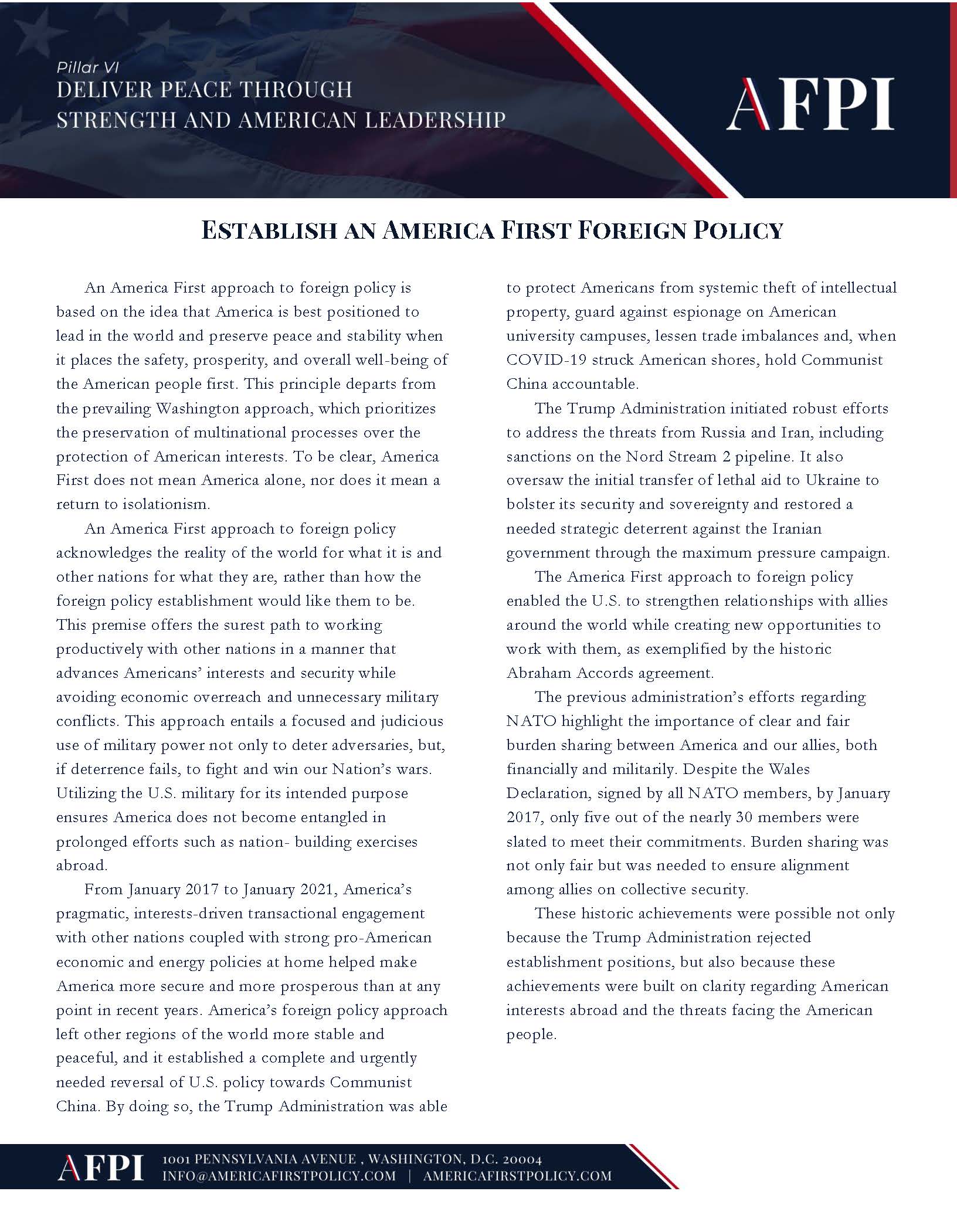Pillar VI: Deliver Peace Through Strength and American Leadership
Establish an America First Foreign Policy
An America First approach to foreign policy is based on the idea that America is best positioned to lead in the world and preserve peace and stability when it places the safety, prosperity, and overall well-being of the American people first. This principle departs from the prevailing Washington approach, which prioritizes the preservation of multinational processes over the protection of American interests. To be clear, America First does not mean America alone, nor does it mean a return to isolationism.
An America First approach to foreign policy acknowledges the reality of the world for what it is and other nations for what they are, rather than how the foreign policy establishment would like them to be. This premise offers the surest path to working productively with other nations in a manner that advances Americans’ interests and security while avoiding economic overreach and unnecessary military conflicts. This approach entails a focused and judicious use of military power not only to deter adversaries, but, if deterrence fails, to fight and win our Nation’s wars. Utilizing the U.S. military for its intended purpose ensures America does not become entangled in prolonged efforts such as nation- building exercises abroad.
From January 2017 to January 2021, America’s pragmatic, interests-driven transactional engagement with other nations coupled with strong pro-American economic and energy policies at home helped make America more secure and more prosperous than at any point in recent years. America’s foreign policy approach left other regions of the world more stable and peaceful, and it established a complete and urgently needed reversal of U.S. policy towards Communist China. By doing so, the Trump Administration was able to protect Americans from systemic theft of intellectual property, guard against espionage on American university campuses, lessen trade imbalances and, when COVID-19 struck American shores, hold Communist China accountable. The Trump Administration initiated robust efforts to address the threats from Russia and Iran, including sanctions on the Nord Stream 2 pipeline. It also oversaw the initial transfer of lethal aid to Ukraine to bolster its security and sovereignty and restored a needed strategic deterrent against the Iranian government through the maximum pressure campaign.
The America First approach to foreign policy enabled the U.S. to strengthen relationships with allies around the world while creating new opportunities to work with them, as exemplified by the historic Abraham Accords agreement.
The previous administration’s efforts regarding NATO highlight the importance of clear and fair burden sharing between America and our allies, both financially and militarily. Despite the Wales Declaration, signed by all NATO members, by January 2017, only five out of the nearly 30 members were slated to meet their commitments. Burden sharing was not only fair but was needed to ensure alignment among allies on collective security.
These historic achievements were possible not only because the Trump Administration rejected establishment positions, but also because these achievements were built on clarity regarding American interests abroad and the threats facing the American people.
THE FACTS
- Before Putin’s invasion of Ukraine, only 10 out of 30 NATO members contributed the 2% of their GDP to which they committed in the 2014 Wales Declaration.
- The Abraham Accords is the first peace agreement between Israel and its neighbors in more than 25 years, and the first-ever normalization of relations between the Israelis and the citizens of other Middle East nations.
- After the signing of the Doha Agreement with the Taliban in February 2020 to begin intra-Afghan peace talks, not a single American service member was killed in Afghanistan from that moment until the end of the Trump Administration.
THE AMERICA FIRST AGENDA
At the federal level, support policies that:
- End the use of military or tax dollars for nation building.
- Support policies that tie federal funding — whether military, diplomatic, or foreign assistance — to clear objectives that directly benefit the American people.
- Revamp foreign assistance, particularly through institutions such as the U.S. International Development Finance Corporation, into investments in local partnerships with clear economic benefit to their communities.
- Give priority to nations that are willing to fight for themselves against common threats and have demonstrated a willingness to shoulder their share of the burden for providing for collective defense efforts.
- Prioritize working with nations that contribute their fair share to our alliances.
- In the European theater, reimpose defense ties with nations that have met or exceeded their 2% NATO GDP commitments and have demonstrated clear alignment of vision and resources with America’s in terms of countering Communist China and addressing the threat from Russia.
- Do not subordinate national security policy to multilateral institutions and other nations.
- In situations where multilateral institutions work in conflict with American security and interests,
- America’s leadership should reserve the right to withdraw American membership and cease sending taxpayer dollars to them.
REFERENCES
AFPI on America’s Security and Standing in the World after Putin’s Invasion of Ukraine, America First Policy Institute (Feb. 2022).
Center for American Security Overview by Lt. Gen. (Ret.) Keith Kellogg and Jacob Olidort, America First Policy Institute (May 2021).
Fear of Donald Trump Kept Putin from Invading Ukraine. Here’s How Trump Pulled It Off by John Ratcliffe and Cliff Sims, The Federalist (March 2022).
How the Left Is Using Ukraine to Discredit Trump and ‘America First’ by Fred Fleitz, American Greatness (March 2022).
Russia, Ukraine, and NATO’s future – America’s next crisis by Lt. Gen.(Ret.) Keith Kellogg, Fox News (Feb. 2022).
Why the New Abraham Accords Caucus Matters by Fred Fleitz, Newsmax (Jan. 2022).
